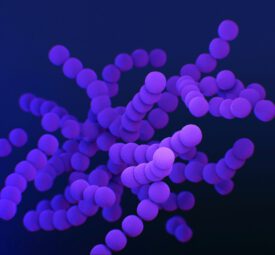Importance of Infant Nutrition and Childhood Diet in the Development of Neurodevelopmental Disorders such as ADHD
Neurodevelopmental disorders are a heterogeneous group of conditions characterized by developmental deficits of the central nervous system that usually start early in life (1). These disorders, which can manifest themselves from mild to severe forms, lead to impairments in personal, social, academic and/or occupational functioning (1). Attention deficit hyperactivity disorder (ADHD) is one of those neurodevelopmental disorders listed in the diagnostic guidelines, and is characterized by developmentally inappropriate levels of hyperactivity, impulsivity and/or attention problems (1). Its prevalence is not negligible, in fact ADHD is currently the most common neurodevelopmental and neurodevelopmental disorder in childhood, affecting approximately 5% of children...
Environment, gut, immune system and brain – a finely tuned gear system
Gut feeling – just a feeling or an important voice? We all know the feeling of having “butterflies in our stomach”, “making decisions based on our gut”, or negative emotions that “turn our stomach”. For a long time, however, these feelings were not taken as a serious basis for decisions and people preferred to rely on their intellect instead. Because our intestines can’t know more than our brain, right? But wouldn´t it be surprising if our largest inner organ had no function other than the digestion of food? It is now known that the gut is an important gateway between...

On: 25 July 2021
How Genetics and Maternal Diet Effect ADHD in Children
The development of ADHD in children has a strong genetic component. It also has an environmental component as well. Part of that environment is the effect of nutrition. NOTE: Consult your doctor before trying any diet discussed in this study. Berit Skretting Solberg MD PhD is conducting a large population study (95,000 mothers, 113,000 children, 70,000 fathers) to see how big the effects are of both genetics and nutrition. This video is a Research Update. Analysis and conclusions are expected to be published by the middle of 2022...
How do we learn if disturbances in gut microbiota cause behavioral problems?
“Can disturbances in the gut microbiota composition cause behavioral problems?” That is the question frequently asked when I present my studies. In the past several years, I have been looking into the correlations of the gut microbiota composition with problem behavior in healthy children. But correlation is not the same as causation. In this blog, I will explain what is needed to answer the above question about causation. First, to explain the difference between correlation and causation, think about this example: on a warm summer day, there is a high correlation between the number of ice creams sold, and the...
Mobile App tracks food intake, physical activity, and behavior successfully
As part of Work Package 3 of the Eat2beNICE Project we conduct the “APPetite-study: Effects of physical activity and exercise in interaction with diet”. The main goal of the study is to assess short-term effects of physical activity, diet and their interaction on impulsivity in daily life. For example, we want to find out whether eating foods high in fat or sugar leads to increases in impulsivity and whether physical activity plays a role in this context. To answer this question – and many more, we developed the APPetite-mobile-app. The APPetite-mobile-app captures short-term associations between diet, physical activity and impulsivity...
We are what our bacteria eat
Today, on July 1, I will defend my doctoral thesis. This thesis is about my research on the effects of nuts and the Mediterranean diet on gut microbiota, BMI and blood sugar levels. In this blog I will highlight some of my research and how this may help you to improve your diet. A long time ago, Hippocrates said “We are what we eat”. But a new revolutionary idea in medicine is pointing out the major role of gut microbiota in our health status and, more importantly, how diet influences its overall wellbeing. During the last decade, there has been...

On: 29 June 2021
The Elimination Diet and ADHD Symptoms: The TRACE Study
Annick Huberts-Bosch is a PhD candidate at Karakter Child and Youth Psychiatry University Centre (Nijmegen, the Netherlands) at the TRACE project and specializes in ADHD.
She gives an update on The Trace Study, a two arm randomized controlled trial comparing the short and long term effects of an elimination diet and a healthy diet in children with ADHD ...
Probiotics and good lifestyle habits
Our bodies are constantly influenced by external factors that interfere with the bodily balance state, called homeostasis. To keep this balance, we have many systems in our body that aim to keep or restore this state when an external factor causes perturbations. Probiotics and a healthy lifestyle are one way to maintain a healthy balance of our intestinal microbes. A healthy microbiota is characterized by resistance and resilience. This is defined as the ability to resist an external perturbation and to return to the pre-perturbation state after a change occurs, respectively [1]. Gut microbiota are excellent at adapting to new...
Diabetes and being overweight are linked to worse cognitive performance in elderly people
Type 2 diabetes is one of the most frequent diseases among elderly individuals, affecting 1 in 3 individuals above the age of 60 years [1]. Not only is diabetes a chronic metabolic disease affecting the individual’s health, it also influences cognitive performance. Researchers of the European Project Eat2beNICE investigated the presence of type 2 diabetes and cognitive decline in older individuals in a situation of overweight or obesity and high cardiovascular risk [2]. They found that individuals with type 2 diabetes performed worse on cognitive tasks in comparison to individuals without diabetes. The combination of diabetes, high BMI, and depression...
Can a mother’s diet during pregnancy cause ADHD?
There is increasing evidence that the environment in the womb during pregnancy might be important in the development of neurodevelopmental disorders, such as ADHD. The fetus may be sensitive to environmental influences, such as what the mother eats during critical stages of her pregnancy. For example, studies showed that malnourishment of the mother could impact brain development in her child [1]. These influences could sustain a long time after birth and even into adulthood [2]. Thus, maternal nutrition could play a crucial role already before birth. However, it is unknown how differences in maternal diet might influence the development of...







